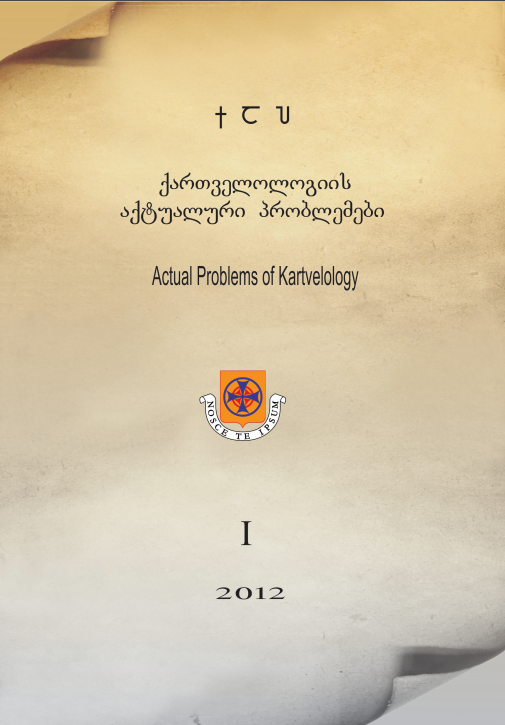Concepts Conveying the Meaning of “Freedom” in the old Georgian Language
Keywords:
Concepts Conveying the Meaning of “Freedom”Abstract
Disclosing ancient (primary) word meanings by linguists is of great importance for revealing early representations of these or those people on an objective reality. Freedom _ the motivating force of mankind. Without it this or that nation cannot exist and develop, cannot create national culture, nor protect the advantage. Free can be both the individual person and society. "Freedom" - the most ancient concepts of the Georgian language regularly met both in the Bible and of many monuments of the ancient Georgian literature; it is widely used in modern Georgian language; the concept of "freedom" has some synonyms. Along this, the concepts which are of interest for deep studying of a phenomenon of "freedom" are allocated. "Freedom" represents concept of the proof maintenance. Its definition is unequivocal in the historical and modern plan. The concept of "freedom" ("clearing") of ancient Georgian language is presented by group of keywords which recreate difficult step character of ideological loading of "clearing". Each of them has special value in disclosing full process of "clearing" the meaning. Such words are "tavis-upleba", "sky", "nebiskopa", "guls-modgineba", "rescue" ("outcome"). The free will of the person represents inner and innate phenomenon, divine gift. The person is free in the choice, that he uses the will to make a free choice, plan a way of the action. The further success in business depends on the correctness of a free choice. Thus, it is necessary to remark that a personal will needs to be realised in business, whereas "freedom" will not be reached. In the Georgian concept "tavis-upleba" the idea of ability of free choice is displayed, "guls-modgineia" means "will", "nebis-kopa" comprises the sense of "will realizations". And concepts such as "khsna"(rescue) and "ganrineba"(liberation) convey the meaning of pushing away and separating from oppressing, connecting and bad force. Our research shows that the term "tavisupleba" (freedom) in old Georgian language and shows original understanding of the essence of a problem.
References
ს.ს. ორბელიანი 1993 - სულხან-საბა ორბელიანი, ქართული
ლექსიკონი (ავტობიოგრაფიული ნუსხების მიხედვით მოამზადა,
გამოკვლევა და განმარტებათალექსიკის საძიებელი დაურთო ილია
აბულაძემ), I, თბ. 1991; II, თბ. 1993;
ნ.ჩუბინაშვილი 1961 - ნ. ჩუბინაშვილი, ქართული ლექსიკონი
რუსული თარგმანითურთ (ალ. ღლონტის რედაქციითა და
გამოკვლევით), თბ. 1961;
ნ. ჩუბინაშვილი 1971 - ნ. ჩუბინაშვილი, რუსულ-ქართული
ლექსიკონი, (ალ. ღლონტის რედაქციითა და წინასიტყვაობით, I, თბ.
; II, თბ. 1971;
დ. ჩუბინაშვილი 1984 - დ. ჩუბინაშვილი, ქართულ-რუსული
ლექსიკონი (სასტამბოდ მოამზადა და წინასიტყვაობა დაურთო აკაკი
შანიძემ), თბ. 1984; ი. აბულაძე 1973 -ი. აბულაძე, ძველი
ქართული ენის ლექსიკონი, თბ. 1973;
ზ. სარჯველაძე 1984 - ზ. სარჯველაძე, ძველი ქართული ენის
ლექსიკონი, თბ. 1995;
ქეგლ 1984 - ქეგლ, II, თბ. 1951; ტ. V, თბ 1984;
ივ. ჯავახიშვილი 1982 - ივ. ჯავახიშვილი, ზოგადი მოძღვრება
ადამიანისბუნებასა დაკანონმდებლობაზე, თხზ-ნი 12 ტომად, ტ. VI,
თბ. 1982. გვ. 122;
თ. ბაგრატიონი 1960 -თ. ბაგრატიონი, განმარტება პოემა
`ვეფხისტყაოსნისა”, თბ. 1960;
მ. რობაქიძე 2011 - მ. რობაქიძე, ადამიანის შინაბუნების
აღმნიშვნელი ცნებების სემანტიკური ველის შესახებ ქართულ ენაში,
ლინგვოკულტუროლოგიური ძიებანი (პირველი საერთაშორისო
კონფერენცია ლინგვოკულტუროლოგიასა და ანთროპოლოგიაში),
ბათუმი, 2011, გვ. 26-32;
მ. რობაქიძე - მ. რობაქიძე, `თავ” სიტყვით შედგენილი ორი
ანტონიმური კომპოზიტისშესახებ ქართულ ენაში, არნოლდ ჩიქობავას
საკითხავები, XXI, თბილისი;
მ. რობაქიძე 2009 - მ. რობაქიძე, `„ვეფხისტყაოსნის”
ანთროპოლოგიურ ცნებათა ინტერპრეტაციისათვის, თბ. 2009;
მ. რობაქიძე 2009 - მერაბ რობაქიძე, `შუშანიკის წამების”
ანთროპოლოგიურ ცნებათა ინტერპრეტაცია, თბილისი, 2009;
დ. მელიქიშვილი 1999 -დამანა მელიქიშვილი, ძველი ქართული
ფილოსოფიურ-თეოლოგიური ტერმინოლოგიის ისტორიიდან,
თბილისი, 1999;
ი. მელიქიშვილი 2008 _ ირინე მელიქიშვილი, თავისუფლების
ცნების ეტიმოლოგიური დიაპაზონი. სოციალურიდან
ინდივიდუალურამდე, ენათმეცნიერების საკითხები _ II;
ი. პეტრიწი - იოანე პეტრიწი, განმარტება პროკლე დიადოხოსის
`ღმრთისმეტყველების საფუძვლებისა” (თანამედროვე ქართულ ენაზე
გადმოიღო, გამოკვლევა, ლექსიკონი და შენიშვნები დაურთო დამანა
მელიქიშვილმა), თბილისი;
ნ. ემესელი 1914 _ ნემესიოს ემესელი, ბუნებისათAს კაცისა,
ბერძნულითგან გადმოღებული იოვანე პეტრიწის მიერ, ქართული
ტექსტი შეისწავლა, გამოსაცემად დაამზადადა ლექსიკონ-საძიებლები
დაურთო ს. რ. გორგაძემ, ტფილისი, 1914;
ი. ცურტაველი 1978 - იაკობ ცურტაველი, მარტAლობაÁ შუშანიკისი
(ქართული დასომხური ტექსტები გამოსცა, გამოკვლევა, ვარიანტები
ლექსიკონი და საძიებლებიდაურთო ილია აბულაძემ), თბ. 1978;
ი. საბანისძე 1963 `მარტAლობაÁ ჰაბო ტფილელისა”, ძველი
ქართული აგიოგრაფიული ლიტერატურის ძეგლები, წიგნი I (V-X
სს.), თბ. 1963
Published
How to Cite
Issue
Section
License
Copyright (c) 2025 Actual Problems of Kartvelology

This work is licensed under a Creative Commons Attribution-NonCommercial-NoDerivatives 4.0 International License.









